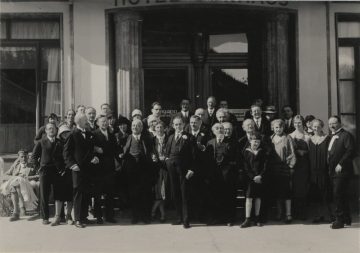Samuel Earle in New Statesman:
 If every philosopher has a home that is not a house – the mountains, the sea, the city streets – for Martin Heidegger, it was the Black Forest. This sprawling woodland, situated by the French border in south-west Germany, imbued Heidegger’s language – his writings are filled with references to “forest paths”, “waymarks” and “clearings” – and shaped his thought. There, in the solitude of his small wood cabin, he wrote his great work, Being and Time.
If every philosopher has a home that is not a house – the mountains, the sea, the city streets – for Martin Heidegger, it was the Black Forest. This sprawling woodland, situated by the French border in south-west Germany, imbued Heidegger’s language – his writings are filled with references to “forest paths”, “waymarks” and “clearings” – and shaped his thought. There, in the solitude of his small wood cabin, he wrote his great work, Being and Time.
The forest even infused Heidegger’s love life. During his affair with Hannah Arendt, which began in 1924 while she was his student, Heidegger referred to her as his “wood nymph”. Following Hitler’s ascent to power in 1933, Arendt, who was Jewish, was forced to flee. But their relationship resonated long after, in what the late scholar of comparative literature Svetlana Boym called a “lover’s discourse”. In language, if not in life, “the poetic landmarks of their interaction” – an exchange of concepts such as home, world and freedom; a shared aching for ancient Greece; and a small chest of classical quotes to call upon – stood until the end.
But today it’s another of Heidegger’s relationships that overshadows his life and legacy: his affiliation with the Nazi Party, which he joined in 1933 and never truly renounced. Heidegger and Hitler also shared a lover’s discourse of sorts: terms such as Heimat (homeland), Volk (people) and “historical destiny”, a fondness for the German forest, and contempt for cosmopolitanism and “humanism”. Since the posthumous publication of Heidegger’s private notebooks, their common foe is also beyond doubt, despite his feelings for Arendt: “World Jewry”.
More here.
